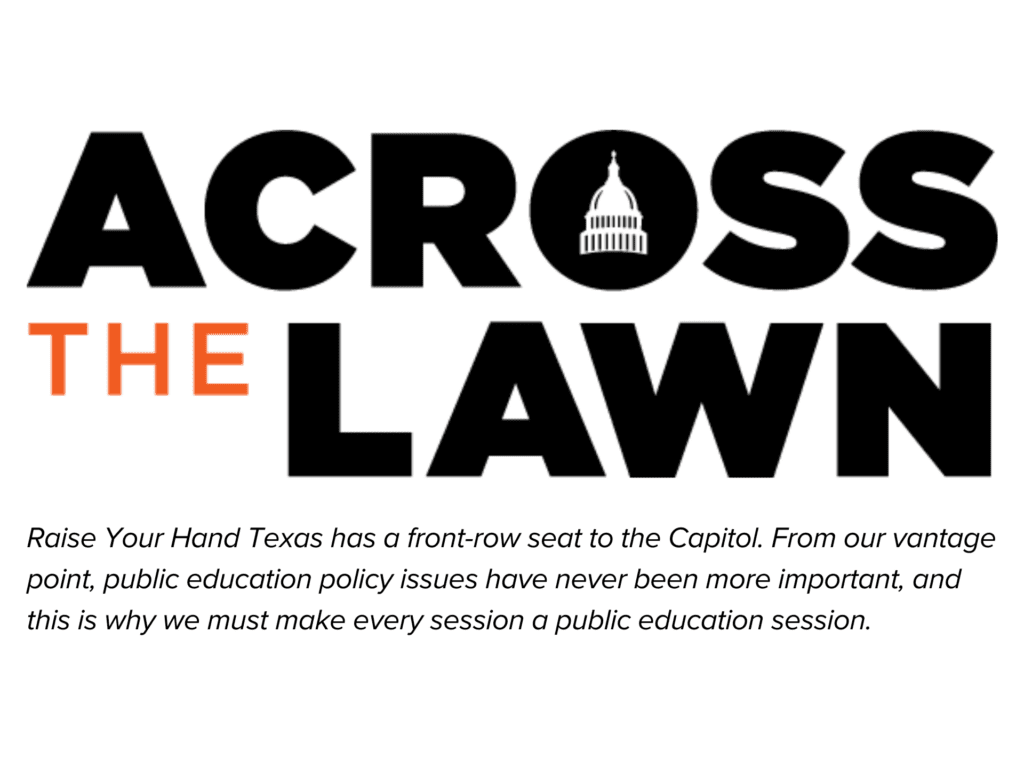
categories
Across the Lawn – May 30, 2025

May 30, 2025

One Thing to Do: Tell Your Lawmakers To Pass the House Version of HB 4
With only days left in the 89th Legislative Session, now is the time for you to help push House Bill 4 to the finish line and end the STAAR test. Click below to participate in our Call to Action and tell Texas lawmakers to pass the House version of HB 4.
1. Two-Year State Budget Finalized
The state budget for the next two years, the 2026-27 biennium, was released on Wednesday, May 30, 2025. The over 1,000-page General Appropriations Act will provide $338 billion in All Funds (federal and state revenue) for our state agencies and services.
The bill authorizes $8.5 billion for public education, including increases to certain Teacher Retirement System of Texas (TRS) benefit provisions, $10 billion in new funding as part of a $51 billion total investment in property tax relief, and $1 billion for the new Education Savings Account (aka voucher) program to be implemented during the 2026-27 school year.
School Funding and House Bill 2
The state budget authorizes $8.11 billion for House Bill 2 (HB 2). The bill raises the Basic Allotment from $6,160 to $6,215 and creates a new $1.3 billion Adjusted Basic Cost Allotment to help districts mitigate rising fixed costs, including insurance, utilities, and transportation.
HB 2 also includes a $45 per student support staff allotment and provides recurring teacher pay increases based on district size and years of service, ranging from $2,500 to $8,000.
The bill restructures special education funding into a tiered model and increases funding for career and technical education programs, including funding for junior ROTC and military pathway courses.
The Teacher Incentive Allotment program is also expanded in this bill. New designation levels are added for acknowledged teachers and national board-certified teachers. The funding amounts for master, exemplary, and recognized teachers were also increased, with the top allotment rising from $32,000 to $36,000 for a teacher with a Master designation.
2. Will Changes to STAAR and School Accountability Cross the Finish Line?
A compromise to House Bill 4 (HB 4), which makes changes to the state’s STAAR and A-F accountability system, is still being negotiated as the Legislature quickly approaches the Saturday, May 30, deadline to distribute conference committee reports.
The House and Senate each proposed major changes to Texas’s assessment and accountability systems, but they differed in both structure and timeline.
Regarding testing reform, the House proposed fully replacing STAAR with nationally norm-referenced assessments for grades K-8, administered at the beginning (BOY), middle (MOY), and end (EOY) of the school year. The system would focus heavily on measuring student growth throughout the year. The House version makes it a local option for several tests not required by federal law, including 8th-grade social studies, U.S. History EOC, and English II EOC. It removes standalone writing assessments and shifts to a through-year instructional growth model, with a 24-hour turnaround for results.
The Senate took a different approach. It authorized the Texas Education Agency (TEA) to develop or adopt optional BOY and MOY assessments and a required EOY exam that is criterion-referenced. The EOY assessment must be shorter than STAAR 2025 if possible, scheduled close to the end of the school year, and scored quickly. The Senate version preserves across-year growth measurement and requires a separate writing component that includes teacher involvement in scoring.
On accountability, both the House and Senate versions maintain the A–F rating system, but the House placed stricter boundaries on the timing by which rules must be finalized. The House requires the commissioner to adopt rules by July 15, before the start of the school year, and delays the use of lagging indicators, such as college and career readiness and graduation rates, until the current class of freshmen becomes seniors. It also adds local accountability indicators for elementary and middle school campuses. The Senate allows rules to be adopted at any time before ratings are issued, giving the TEA more flexibility.
The House version takes effect on September 1, 2025, applying to the 2025–26 school year. The Senate version delays implementation until the 2027–28 school year, allowing for additional time to develop and test new systems.
3. Student Discipline Bill to be Sent to Governor
The House adopted the Senate amendments to House Bill 6 (HB 6), the student discipline bill, by Rep. Leach on Wednesday, May 28, 2025. The bill now heads to the Governor. This student discipline bill contains the following provisions.
- Suspension Rules: Out-of-school suspension capped at three days; in-school suspension capped at 10 days.
- Grades below 3rd grade: Out-of-school suspensions limited to cases involving immediate threats to safety or serious classroom disruptions.
- Expulsion: No longer limited to on-campus behavior, off-campus offenses can now result in expulsion.
- Virtual Disciplinary Alternative Education Programs (DAEPs): Schools may establish virtual DAEPs and provide remote instruction and materials. Students in these programs would count toward state funding (ADA).
- Parental Involvement: School boards may adopt a policy to involve parents in school disciplinary placements. If the parent and student comply with the behavioral agreement, the student may receive a reduction in the disciplinary placement period.
- Removal for Certain Conduct: Possession of e-cigarettes no longer requires removal from class.
4. Other Public Education Bills Sent to Governor Abbott
There are over 90 school and teacher-related bills that have passed both chambers with just three days remaining in the 89th Legislature. Some of the bills that have been sent to Governor Abbott include:
- SB 11: Period of prayer and Bible reading in public schools
- SB 24: Required instruction on communist regimes in social studies
- SB 314: Ban on certain food additives in school meal program
- SB 207: Excused absences for mental health appointments
- SB 991: Chronic absenteeism included in dropout risk and data reporting
- SB 2185: Changes to bilingual education allotment
- SB 2314: Launch of the “My Texas Future” planning portal
- SB 843: TEA database for school district bond and tax data
- HB 2674: Prohibits regulation of homeschool programs
- SB 2929: Removal of unruly spectators from school sports events
- HB 1481: Limits on student phone use during class time
- SB 965: Religious expression rights for school employees
- HB 1586: Expanded exemptions from required school immunizations
- HB 1851: Surplus law enforcement equipment donation to school districts
- SB 1502: Authority for districts to adopt tax rates above voter threshold
- SB 1415: Expands sales tax holiday for school-related items



